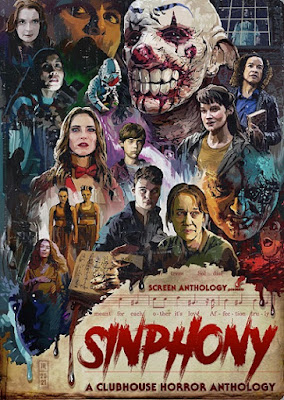According to this anthology, Tiktok is evil (which is definitely true), but Clubhouse is good. The evidence for the latter is inconsistent, based on the following tales, conceived and directed by community-members using the audio app. However, the song linking most of the stories together is rather catching, in a sinister kind of way. The “Fortress” theme repeatedly pops-up in Sinphony, which is now playing in theaters and on-demand, following its premiere at the Brooklyn Horror Film Festival.
Things start with a merciful brief birth gone-very-wrong that introduces the “Fortress” song and a rather malevolent healthcare worker, before the first proper constituent tale starts. Wisely, Sinphony starts with the best of the lot (but that also means it is all downhill from here). Fittingly, Jason Ragosta’s “Mother Love” features a coven of witches using a Clubhouse like app. Unfortunately, one of them must protect her young son from a serial killer preying on her witchy kind, while her sisters listen in. It is a tight and tense combination of home invasion and witchcraft horror that puts fresh spins on both.
Steven Keller’s “Ear Worm” offers up some standard body horror, but the set-up is pretty good. The anthology rebounds with Haley Bishop’s “Forever Young,” which is probably the most zeitgeisty story in Sinphony. Not thrilled to be turning thirty, a not-as-cool-as-she-used-to-be woman tries to prove her hipness with the latest Tiktok like dance video app. The ironic results are horrifying. They also reflect the fears that are now pervasive in society of the way social media and big tech censors, silences, corrupts, and manipulates us.
Unfortunately, “Forever Young” represents Sinphony’s second and final notable peak. Kimberly Elizabeth’s “Do Us Part” is a somewhat successful depiction of a dead wife haunting her mourning husband, but it plays more like a darkly comic sketch. There is a lot of potentially interesting stuff in Mark Pritchard’s “Limited Edition,” but it does not have sufficient time to establish and explain its supernatural elements (including a mysterious text that reappears in later episodes). Frustratingly, it leaves the audience wondering: “huh, wha?” (Still, there is something intriguing about this installment that cries out for fuller feature-length treatment.)
Wes Driver’s “The Keeper” is anchored by such a nice performance from Ronnie Meek as the Innkeeper in question, it keeps viewers hooked, even though we can guess the secret the new family that checked-in is hiding. In contrast, there is not much suspense to Jason Wilkinson’s grim “Tabitha” chronicling a woman’s final moments after she was shot fleeing a crime, while she faces her real and metaphorical ghosts.
At least there is more going on in Nichole Carlson’s “Maternally Damned,” following an unplanned pregnancy that resulted from a man may have been a vampire, or something else supernatural. Perhaps the coolest part of this tale is the torchy jazz arrangement of “Fortress.”
Sinphony is not exactly great, but at least it has a few highpoints—and its low points never crater as low as those in V/H/S/99. It is definitely an anthology to wait to stream for free and fast-forward through the weak patches. Earning a decidedly mixed review, Sinphony is now in theaters and on-demand.

